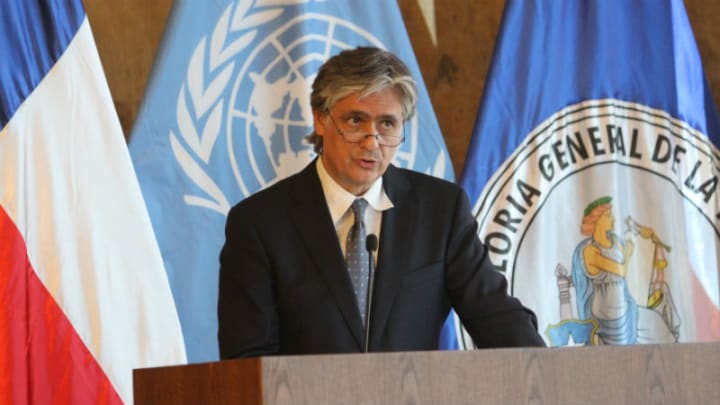
UNITED NATIONS — The Spotlight Initiative, a €500 million ($585.2 million) joint United Nations and European Union partnership to combat violence against women, will provide an update on its work over the last year during a high-level event at U.N. headquarters Thursday morning.
Mexico is set to receive funding for a minimum two-year project to research and combat femicide — the targeted killing of women and girls. Mexico is one of the most dangerous countries for women and girls, and reported rates of femicide have reportedly risen over the last decade.
The partnership is unique, as U.N. Resident Coordinator Antonio Molpeceres explained that Mexico typically receives little support from outside donors.
“This is the exception, Spotlight. It is money that is coming in from outside, to the U.N., to help solve a problem. I think this is important to say,” he told Devex.
More on UNGA 2018:
► As UNGA kicks off, Guterres calls for urgency
► In Trump's US aid review, can development principles prevail?
► International Finance Facility for Education musters growing support
Devex sat down with Molpeceres ahead of the meeting to discuss how femicide needs to be rethought, and how his own role as U.N. resident coordinator might be changing with the onset of U.N. reforms in 2019.
The conversation has been edited for length and clarity.
How does Mexico’s status as a high middle-income country impact the nature of the U.N.’s work there?
The challenge is the same in any type of country — to coordinate the U.N. system. That is one of the objectives of this reform that the secretary-general is promoting. How can we better work together and have better results and less duplication, so we do not use scarce resources inefficiently. In terms of coordination, it is difficult for me to imagine it being much more different in a low-income country than in a middle-income country because it is about working with people. It is about getting people on board to work together and use their added values to be more productive.
How do you expect your work will change, then, once U.N. reform takes effect?
U.N. reform — or improving coordination — is something we have been talking about for many, many years. What is different this time is we do have a framework we can share and work within, which is Agenda 2030.
Also there is the idea of the secretary-general to empower the resident coordinator. I have heard people say they have an image of an RC as someone directing all the musicians (the heads of agencies), to make beautiful music. The idea is to have the RC focus on coordination. Up until now, we have focused on coordination, but have also been representatives of the U.N. Development Programme.
How will the Spotlight initiative work unfold in Mexico?
If the U.N. is going to do anything, anywhere, it has to be working to reduce violence against women and girls. In Mexico there is violence, but then there is also femicide.
This is a special fund because it is the first interagency fund born from, and linked to, U.N. reform. It is not being managed at the level of an agency, but at secretariat level. The way it is set up, we have to work with different agencies. In the case of Mexico, we have six agencies participating.
“If the U.N. is going to do anything, anywhere, it has to be working to reduce violence against women and girls.”
— Antonio Molpeceres, U.N. resident coordinatorThe idea is to work in three Mexican states — the state of Mexico, surrounding Mexico City, Chihuahua, in northern Mexico, and the state of Guerrero, one of the most violent states. We want to study the life cycle of violence against women. We want to understand why there is violence against a 5-year-old girl, as opposed to a 65-year-old woman. That will allow us to better propose actions to reduce violence.
What are the major gaps you see with addressing femicide?
In terms of laws, Mexico is very advanced. They have everything on paper, but then there are issues related to data. How many women really are murdered because they are women, or suffer violence? That is something we want to better identify.
In addition, Mexico is a decentralized country. You may have a strong state in one part of the country, a weak one in another. We want to show that you can work with a state like Guerrero, which has a lot of challenges, and that there can be an impact.
There are challenges. Much of the violence is domestic, unseen, and if we are identifying 10, 15, or 20 percent of the violence women suffer, that is a lot. The project could help increase reporting. That would be a great thing.
NCDs. Climate change. Financing. Read more of Devex's coverage from the 73rd U.N. General Assembly here.




